|
|
|
Sort Order |
|
|
|
Items / Page
|
|
|
|
|
|
|
| Srl | Item |
| 1 |
ID:
058793
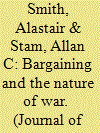

|
|
|
| 2 |
ID:
053707
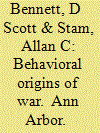

|
|
|
|
|
| Publication |
Ann Arbor, University of Michigan press, 2004.
|
| Description |
xii, 289p.
|
| Standard Number |
047206844X
|
|
|
|
|
|
|
|
|
|
|
|
Copies: C:1/I:0,R:0,Q:0
Circulation
| Accession# | Call# | Current Location | Status | Policy | Location |
| 048636 | 355.02/BEN 048636 | Main | On Shelf | General | |
|
|
|
|
| 3 |
ID:
109574
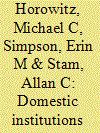

|
|
|
|
|
| Publication |
2011.
|
| Summary/Abstract |
Military leaders, policymakers, and academics have long debated the relative merits of volunteer versus conscript armies. They also have studied the possible effects of eroding resolve among mass publics in democratic states during wartime. In this paper, we use battlefield casualty data from the population of interstate wars to compare theories of property takings and domestic institutions. We find conscription, like other non-market-based property takings, to be a wasteful means of mobilizing military manpower. Volunteer armies suffer far fewer casualties than their conscripted counterparts. We also find that this effect compounds when interacted with regime type. Volunteer democratic armies suffer especially few casualties. Finally, we find that democratic societies are willing to bear the costs of large-scale commitments to maintaining state sovereignty and survival when targeted by authoritarian states, at times in the face of certain defeat.
|
|
|
|
|
|
|
|
|
|
|
|
|
|
|
|
| 4 |
ID:
155187
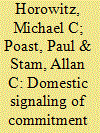

|
|
|
|
|
| Summary/Abstract |
We provide a new perspective on how domestic factors shape the prospects for international cooperation. Internal arms, specifically conscription, signal a willingness and suitability to be a dependable ally. Possessing ineffective military forces inhibits a state’s ability to assist prospective allies and renders a state less able to deter threats on its own. This exemplifies an instance where the trade-off between arms and allies does not apply. Using new data on the military recruitment policies of states since 1816, we find that adopting a conscription-based recruitment system in the previous five years makes a state more likely to form an alliance in the current year, even when accounting for a heightened threat environment.
|
|
|
|
|
|
|
|
|
|
|
|
|
|
|
|
| 5 |
ID:
133273
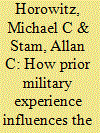

|
|
|
|
|
| Publication |
2014.
|
| Summary/Abstract |
Policy-makers and the electorate assume political executives' life experiences affect their policy choices once in office. Recent international relations work on leaders focuses almost entirely on how political institutions shape leaders' choices rather than on leaders' personal attributes and how they influence policy choices. This article focuses the analytic lens on leaders and their personal backgrounds. We theorize that the prior military background of a leader is an important life experience with direct relevance for how leaders evaluate the utility of using military force. We test several propositions employing a new data set, building on Archigos, that encompasses the life background characteristics of more than 2,500 heads of state from 1875 to 2004. The results show that the leaders most likely to initiate militarized disputes and wars are those with prior military service but no combat experience, as well as former rebels.
|
|
|
|
|
|
|
|
|
|
|
|
|
|
|
|
| 6 |
ID:
066285
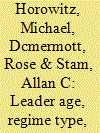

|
|
|
| 7 |
ID:
052174
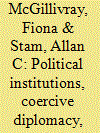

|
|
|
|
|
| Publication |
April 2004.
|
| Summary/Abstract |
A theory of sanction duration that focuses on differences between democratic and nondemocratic states in the structure of leaders' support coalitions is tested, using a hazard model to analyze a data set of 47 sanction events with 272 observations. Results show that leadership change strongly affects the duration of sanctions only in the case of nondemocratic states. Leadership change in democratic states is unrelated to the duration of sanctions; however, leadership change in nondemocratic sender and nondemocratic target states is strongly related to the ending of economic sanctions
|
|
|
|
|
|
|
|
|
|
|
|
|
|
|
|
| 8 |
ID:
147318
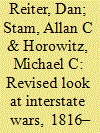

|
|
|
|
|
| Summary/Abstract |
Interstate war data are critical for many important research areas in international relations. Scholars working in these areas frequently rely on the Correlates of War (COW) interstate war data. This article analyzes the COW interstate war data version 4.0, covering the years 1816 through 2007. Using COW coding criteria, the article finds that in more than 30 percent of the ninety-five COW interstate wars, codings of at least one of the key variables—existence of the war, list of participants, initiator, and outcome—needs to be revised. This article describes a revised data set on interstate wars that incorporates these revisions. The data set includes a metric for breaking apart large, multilateral wars such as the World Wars into component wars. For each participant in multilateral wars, it provides information on exactly which states that participant fought, and specific initiation and outcome codings for that participant.
|
|
|
|
|
|
|
|
|
|
|
|
|
|
|
|
|
|
|
|
|